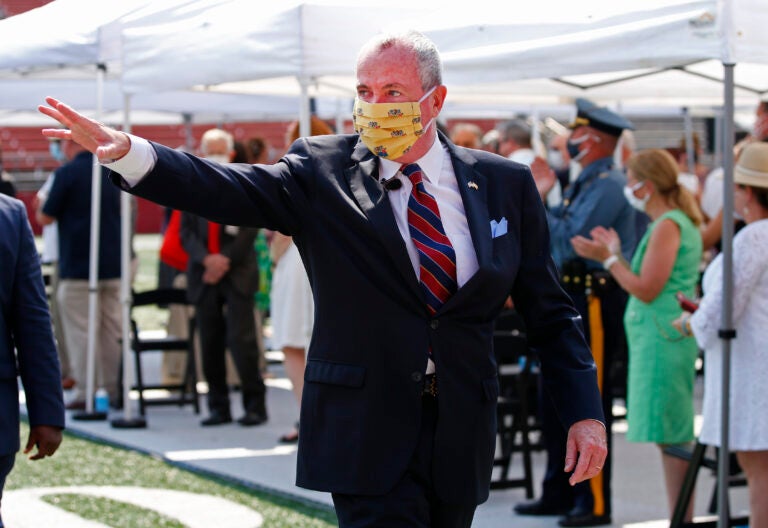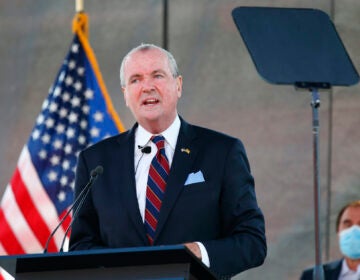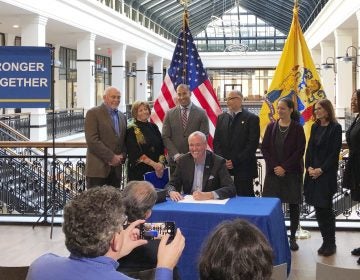N.J. budget to include millionaire’s tax, but scrap ‘baby bonds,’ cigarette tax hike
The proposed budget legislation reflects negotiations among Gov. Phil Murphy and his fellow Democrats who control the Senate and Assembly.

New Jersey Gov. Phil Murphy waves for the audience before his 2021 budget address at SHI Stadium at Rutgers University, Tuesday, Aug. 25, 2020, in Piscataway, NJ. (AP Photo/Noah K. Murray)
A budget for the remaining nine months of New Jersey’s fiscal year will include a tax hike on millionaires but scrap other proposals by Democratic Gov. Phil Murphy, including his “baby bonds” initiative.
The budget agreed to by Murphy and top lawmakers in the Democrat-controlled Legislature became public Tuesday, the same day budget committees in both houses voted on the $32.7 billion plan.
The votes came just days after Murphy, Senate President Steve Sweeney, D-Gloucester, and Assembly Speaker Craigh Coughlin, D-Middlesex, announced they had reached an agreement to enact the so-called millionaire’s tax. It would raise the state income tax on earnings over $1 million from 8.97% to 10.75%.
Murphy has long sought the millionaire’s tax, but was stymied by legislative Democrats, many of whom supported it during the former administration of Republican Gov. Chris Christie.
Still, even though the Democrats in control of New Jersey’s government agree that the millionaire’s tax will help the state raise the money necessary to combat the fiscal problems caused by the coronavirus pandemic, Republicans and business groups have slammed the idea.
“We are in a financial crisis, as well as a health crisis,” said Assemblywoman Nancy Munoz, R-Union, who has suggested cutting spending. “We’ve increased taxes. We’ve increased spending. We’ve increased borrowing.”
The millionaire’s tax will pay for a $500 tax rebate for some 800,000 low-income and middle-class families with children, which Democrats say is critical during the pandemic, but which Republicans have called an election gimmick by Murphy, who will be up for his second term next year.
The budget proposal also includes more than $1 billion in cuts to state spending, as well as a plan to borrow $4.5 billion to spend on the COVID-19 recovery. Borrowing that much money without voter approval can occur due to an emergency borrowing law passed by Democrats and signed by Murphy this summer, which withstood a lawsuit from Republicans hoping to invalidate it.
A corporate business surtax that was meant to be temporary will become permanent under the deal, another item Murphy sought.
Yet he did not get some other budget items he floated in his proposal, such as a “baby bonds” initiative that would have given every baby born into most families next year a $1,000 bond they could collect when they turned 18. A tax hike on cigarettes and an increase in gun permit fees were also scrapped.
“It is not a budget we would want to adopt, but it is a budget that is needed to get us through the COVID-created crisis,” said state Sen. Paul Sarlo, D-Bergen, who chairs the Senate Budget Committee. “This budget will provide support for ongoing priorities and will help address problems created directly or indirectly by the pandemic, and allow us to be prepared for a potential second wave.”
The budget is scheduled for full floor votes in both the state Senate and Assembly on Thursday.

Get daily updates from WHYY News!
WHYY is your source for fact-based, in-depth journalism and information. As a nonprofit organization, we rely on financial support from readers like you. Please give today.



![CoronavirusPandemic_1024x512[1]](https://whyy.org/wp-content/uploads/2020/03/CoronavirusPandemic_1024x5121-300x150.jpg)


